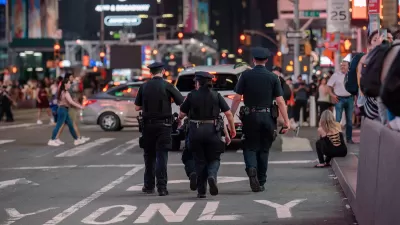The NYPD vaunts crime mapping technologies from CompStat maps to a vast networked surveillance infrastructure. Who benefits?
A multi-billion-dollar industry of data-driven policing technology includes dozens of mapping, surveillance, and data-analysis tools, each claiming to hone in on crime at ever-finer grain. But as data and infrastructure writer Ingrid Burrington argues, these technologies represent less a science for the provision of safety, and more a highly effective sales pitch for a management model born in the zero tolerance Giuliani era. Since the early 1990s, when precinct commanders pushed pins into paper maps, police in New York have contended that if they can track crime, then they can predict it, and therefore prevent it. The maps they’ve made have monopolized media narratives, and shaped the lives of those who live within their frames. The authors of CompStat now export their methods around the world. Business is good for those technology vendors and consultants who sell crime- and fear-reduction as a customer service. But who’s buying? More than a set of tools, crime mappers hawk a model of a future world where the cost of guaranteed order would be accountability to the public.
FULL STORY: Policing is an Information Business

Alabama: Trump Terminates Settlements for Black Communities Harmed By Raw Sewage
Trump deemed the landmark civil rights agreement “illegal DEI and environmental justice policy.”

Study: Maui’s Plan to Convert Vacation Rentals to Long-Term Housing Could Cause Nearly $1 Billion Economic Loss
The plan would reduce visitor accommodation by 25% resulting in 1,900 jobs lost.

Planetizen Federal Action Tracker
A weekly monitor of how Trump’s orders and actions are impacting planners and planning in America.

Wind Energy on the Rise Despite Federal Policy Reversal
The Trump administration is revoking federal support for renewable energy, but demand for new projects continues unabated.

Passengers Flock to Caltrain After Electrification
The new electric trains are running faster and more reliably, leading to strong ridership growth on the Bay Area rail system.

Texas Churches Rally Behind ‘Yes in God’s Back Yard’ Legislation
Religious leaders want the state to reduce zoning regulations to streamline leasing church-owned land to housing developers.
Urban Design for Planners 1: Software Tools
This six-course series explores essential urban design concepts using open source software and equips planners with the tools they need to participate fully in the urban design process.
Planning for Universal Design
Learn the tools for implementing Universal Design in planning regulations.
Caltrans
Smith Gee Studio
Institute for Housing and Urban Development Studies (IHS)
City of Grandview
Harvard GSD Executive Education
Toledo-Lucas County Plan Commissions
Salt Lake City
NYU Wagner Graduate School of Public Service




























